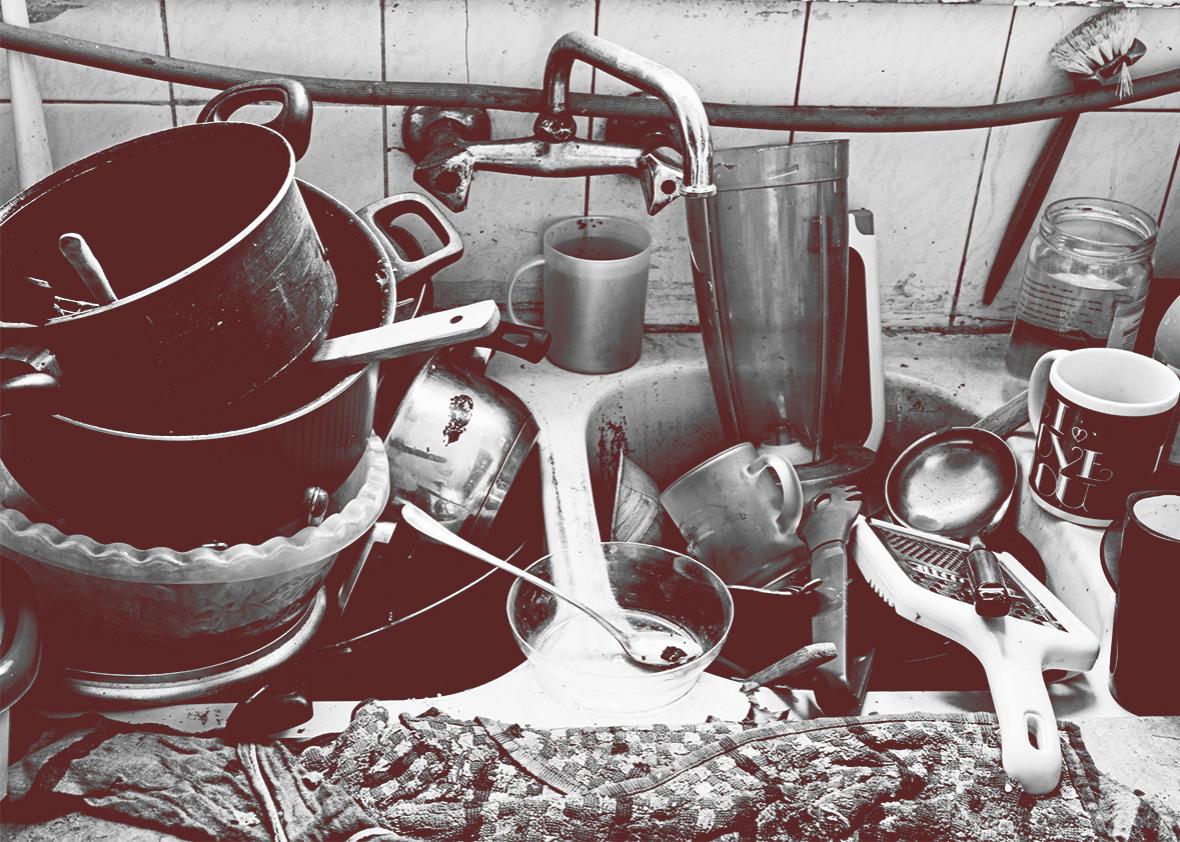Imagine stepping into your office kitchen in the middle of a workday. Is it sparkling clean, impeccably organized, fragrantly scented, and inviting? Or is it a cesspool of unwashed dishes, forgotten Tupperware with dubious contents, disquieting odors, and crumb-strewn countertops? Unless you have a particularly diligent janitor or office manager in charge of keeping the communal kitchen neat and clean, I’d wager it’s more like the latter than the former. No “Your mother doesn’t work here!” sign, no matter how big the font, has ever kept an office kitchen sink devoid of dirty dishes for an entire workday. Even offices populated by kind, lovely, diligent people often have run-down, amoral, even disgusting, kitchens.
The chaotic unpleasantness of office kitchens is often explained as an instance of the tragedy of the commons, the phenomenon by which people exploit and eventually deplete shared resources by acting in their individual self-interest. In a puckish article in the BMJ (formerly the British Medical Journal), researchers at Australia’s Burnet Institute attempted to measure the rate at which spoons disappeared from common areas in their office. (They concluded that “an estimated 250 teaspoons would need to be purchased annually to maintain a practical institute-wide population of 70 teaspoons.”) The researchers explained how the tragedy of the commons applies to their shared spoons:
In the Burnet Institute the commons consists of a communally owned set of teaspoons; teaspoon users (consciously or otherwise) make decisions that their own utility is improved by removing a teaspoon for personal use, whereas everyone else’s utility is reduced by only a fraction per head (“after all, there are plenty more spoons…”). As more and more teaspoon users make the same decision, the teaspoon commons is eventually destroyed.
(For the record, the researchers favor the theory that the spoons slipped through the space-time continuum to “a planet … entirely given over to spoon life-forms.”)
The tragedy of the commons theory explains why unwashed dishes pile up in the sink, why people take the last of the coffee without making more, why office refrigerators become crowded and grody over time. It doesn’t explain why office kitchens so often bring out the worst in people. To pluck a couple of extreme anecdotes from the internet, think about the PR firm CEO who went ballistic on his staff because they didn’t replace the milk, or the self-proclaimed “OCD” staffer who dealt with stress by scrubbing the sink with poisonous drain cleaner. People do objectively bad things in office kitchens, things that they would never do in other settings, things that obviously violate the golden rule, like stealing someone’s clearly labeled almond butter–and-banana sandwich. (Not that I’m still mad about that or anything.) A comprehensive theory of the office kitchen has to account for the site-specific mania induced when normal people share a kitchen. And it also has to account for the fact that, when people aren’t losing their minds, the office kitchen can be an oasis of relaxation and goodwill.
The kitchen is the place in the office where we let our humanity show. When we’re at our desks or in a conference room, we are expected to be dutiful cogs in a well-oiled machine. We suppress our emotions for the sake of the larger enterprise. We talk mostly or exclusively about work, even though our work is often highly boring. Jobs, practically by definition, force us to subsume our selves to an external project.
The office kitchen is a site of self-expression. The food we bring into the office reflects who we are and what we like. We can bring in lunches that reflect our cultural background or that remind us of time spent cooking with our family and friends. It’s impossible to be a cog in the kitchen, because it’s where we’re allowed to admit that we’re human beings with needs and desires, not automatons. The kitchen is where office workers go to satiate their appetites, quench their thirst, and partake of mind-altering substances. (Caffeine, of course. Plus, occasionally, if you’re lucky, alcohol.)
It’s because we can’t avoid being mortals in the kitchen, I propose, that office kitchens are often a site of socialization. Banal, pseudo-complimentary observations like, “Ooooh, whatever you’re microwaving smells good” are a way of acknowledging our shared humanity. If I say something to a colleague as we cross paths in the hallway, it will probably be about a memo I owe him or a project we’re working on. If I say something to a colleague as we cross paths in the kitchen, it will probably be about the weather, or public transportation, or a TV show, or any of the other crucial small-talk topics that allow us to feel a brief but meaningful connection to one another. The kitchen is not just where we take a break from working but where we take a break from being workers.
That’s not always for the best. After bottling up their ids all day, some people let it out in antisocial ways: polishing off the coffee without making more. Stealing sandwiches and spoons. Throwing used dishes in the sink instead of the dishwasher. These actions might be effective forms of protest against the dehumanizing pressures of late capitalism, if they didn’t inconvenience so many innocent people.
